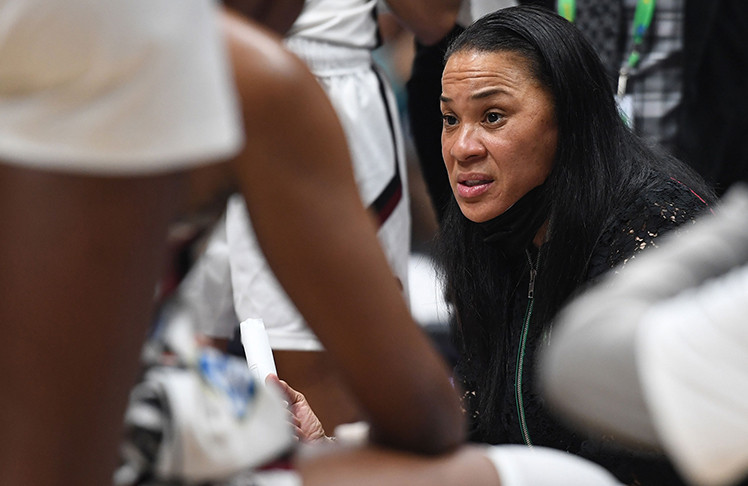
(CNN) — At the top of Dawn Staley’s stacked trophy case is an orange and white basketball. The University of South Carolina women’s basketball head coach said the ball was signed by every Olympic coach, and she finally added her own signature last month. It also serves as a reminder of just how much the game has given her.
Staley was gifted the ball when she was coaching at Temple University, before she coached USA Basketball. In fact, when Staley began transitioning from a player to a coach, she thought all she wanted to do was win. She soon discovered basketball still had so much left for her.
“There are other aspirations that come out of it, like if I want to be a coach, I want to be the best,” Staley told CNN Sport. “This game is filled with so many aspirations, so competitive. So like dreams and realities are at your fingertips and you just have to figure out how to navigate through it.”
Below that basketball is a mountain of trophies. As a young player growing up in Philadelphia, Staley had two goals: become a national champion and an Olympic gold medalist. She now owns six Olympic gold medals — three as a player (1996, 2000, 2004) and three as a coach (2008, 2016, 2021) — and coached the South Carolina national championship team in 2017.
Staley is also a two-time NCAA player of the year (1991, 1992) and a six-time WNBA All-Star. After winning the honor in 2020, Staley is once again a finalist for the Naismith Coach of the Year Award alongside LSU’s Kim Mulkey, Stanford’s Tara VanDerveer and North Carolina State’s Wes Moore.
Coaching at the first March Madness for women’s basketball
On Friday at 7 p.m. ET, Staley will try to get one step closer to another national championship when she coaches her No. 1 seeded South Carolina team through their Sweet Sixteen game against No. 5 North Carolina. The Gamecocks dominated in the first two rounds of the tournament, beating Howard 79-21 and Miami 49-33. However, once again, Staley recognizes this tournament is about more than just winning.
San Antonio’s University of the Incarnate Word made its first NCAA tournament appearance this year as one of the first-four teams. They played in South Carolina’s Colonial Life Arena where they were toppled by Howard, 55-53. After the game, Staley led her team into the tunnel to give Incarnate Word handshakes and high-fives, congratulating them on a great season.
Later that evening, one of the Incarnate Word players took to social media, saying she was sad she didn’t get a picture with Staley. Staley quickly responded and, at 8:45 a.m. the next day, she met the Incarnate Word team and head coach Jeff Dow to take pictures before they returned to Texas.
“Those young ladies — I saw on social media in their press conference — they’re like: ‘You know, we’re happy to be here. This is where Dawn Staley coaches. This is where they play their actual games.’
“I want the game to grow, but I don’t really view us that way and other people view us as like the Mecca of women’s basketball. And to hear that, to hear it, I wanted to make sure that I met them,” Staley explained.
This is the first year that the women’s tournament has 68 teams and play-in games; without the expansion, Incarnate Word wouldn’t have been able to make their historic tournament run. Knowing that, Staley just wanted to make their NCAA tournament experience that much better.
“If we’re asking other people — the decision makers of our game — to give us whatever it is, make it equitable, give us what we deserve; we ourselves, we have to protect that. We have to protect each other, that’s in the game.”
Growing the game beyond the NCAA tournament
After winning the 2017 national championship, Columbia, South Carolina’s mayor named a street near the Colonial Life Arena ‘Dawn Staley Way.’ In January 2021, the university installed a statue of A’ja Wilson for her accomplishments with that championship team.
Just nine months later, on October 15, 2021, the University of South Carolina Board of Trustees approved a seven-year, $22.4 million contract extension, making Staley the highest paid Black coach in women’s basketball and one of the highest paid in the country.
“When we’re hosting the NCAA tournament, again, it’s those lives that are being impacted in a positive way, that experience of being somewhere where women are put on a pedestal,” said Staley. “So I hope this is a place where people will come and say: ‘This is where women get treated well.'”
Staley feels that South Carolina has grown the game and women’s sport as a whole, especially when it comes to equal pay. She wants to see the rest of the country make the same commitment to women’s basketball that South Carolina has. Staley believes the passion for women’s basketball is already there; players, coaches and fans are all locked into the game, the only thing that’s missing is investment.
“We’re women like, if you make us feel good, we’re going to make you feel better. We are that kind of beings, where just treat us good and we will treat you better. We’re going to treat the game better,” said Staley.
“I just think women’s basketball is at a place where we can be revenue producing. I don’t know if it’s going to be on the magnitude of what March Madness is for the men, but I know one thing, they invested in it, and I know the numbers keep growing and growing and growing and growing.”
Turning her players into high impact community members
For now, while she waits for others to invest in women’s basketball, Staley invests in her players and helps them reach their own aspirations. The goals players set for themselves are far and beyond what Staley imagined at their age; she even heard one player say she wants to be a millionaire by the time she graduates college.
“I want them to get everything they can get out of the sport,” she said. “I’ve introduced my entire team to agents all over the country so they can get their brands in order, so they can get the wealth that they deserve.”
“I do this because I’m passionate about my sport. I see little girls who grew up like me. They have a future in this and the more they apply themselves, the more they’re going to get out of it.”
Staley also looks beyond her sport and into local communities. In 2013, she co-founded Innersole, a non-profit that provides sneakers to homeless children and children in need that demonstrate excellence in the classroom in Columbia. The WNBA Community Leadership Award is named after Staley and focuses exclusively on the offseason activities of players who invest in their communities.
Staley wants to generate the same local change through her teams too. When recruiting, Staley looks at a player’s potential for impact both on and off the court.
“I know my impact in Philly. I know my impact here in South Carolina. I’m beginning to find myself and my impact across the country because I hear it from other people,” Staley said.
“So I choose people because of the impact they can make in their neighborhoods. If those neighborhoods can get fixed because of someone that came back and they’re giving back and they’re pouring into them, we’re going to have better neighborhoods.”
Looking back to North Philly
Staley recruits those high-impact players because that’s also her story. After winning her first Olympic gold in 1996, she came back to her hometown of Philadelphia and established the Dawn Staley Foundation: a non-profit meant to support at-risk teenagers with afterschool programs, mentoring and a summer basketball league.
Growing up in the projects of North Philadelphia, Staley said she learned so many lessons and wouldn’t trade her childhood for another in suburbia: “North Philly raised me, and I take it everywhere I go.”
Her mother, Estelle Staley, was a disciplinarian and Staley freely admits she was scared of her mom, but the way she raised Staley and her siblings was integral to all her accomplishments in basketball. As time goes on, Staley sees more and more of her mother in herself. She said she’s her mother’s child through and through, in the way she coaches, mentors and treats those around her.
“She raised my siblings and I, in a way that we could only be successful. There was no room besides for us to be successful,” explained Staley. “There was a perfect peace about my mother that she instilled in us, there’s a certain fight that she instilled in us, there’s a work ethic. Like we only know how to work hard.”
While she looks over all her awards, glittering in their glass cases, and her beloved Olympic basketball, Staley isn’t thinking about what her career has amounted to thus far but where it started: North Philly.
“Honestly, I just want to be known as an odds-beater. Like just simply beat the odds because no one from North Philly — no one from the projects in North Philly — gave me a shot at any of this, like really none of this.
“I had a praying mother. She made sure we went to church, and all of this is divine intervention because you could not have dreamt of this happening to just one individual.”
The-CNN-Wire
™ & © 2022 Cable News Network, Inc., a WarnerMedia Company. All rights reserved.















